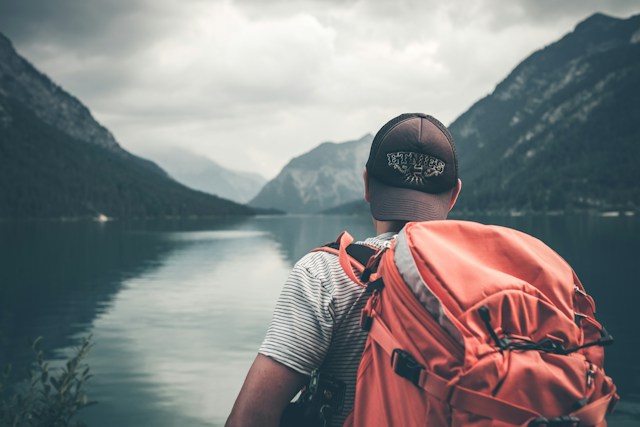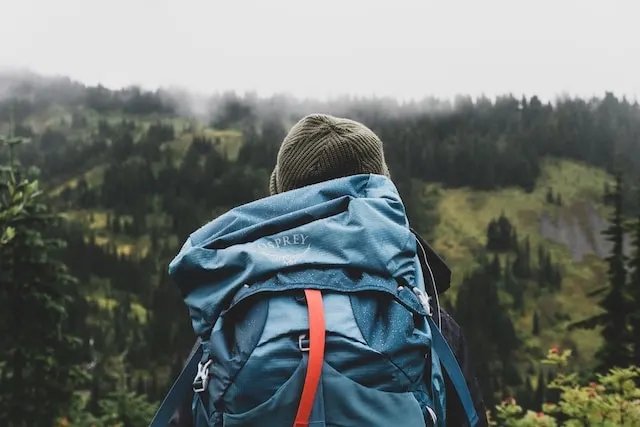Solo backpacking, an exhilarating adventure that involves navigating the world independently, has gained immense popularity in recent years. This form of travel offers individuals the chance to explore the world on their terms, fostering self-discovery and personal growth.

In this article, we will delve into the challenges faced by solo backpackers and celebrate their triumphs, providing insights, tips, and inspiring stories to encourage those considering embarking on a solo backpacking journey.
Introduction | Solo Backpacking Challenges and Triumphs
Solo backpacking is more than just a travel trend; it’s a transformative experience that allows individuals to break free from the conventional and explore the world at their own pace. The increasing number of solo backpackers signifies a growing desire for independence, adventure, and self-discovery. In this article, we will explore the various challenges and triumphs associated with solo backpacking, offering a comprehensive guide for both novice and experienced adventurers.
Is it safe to go hiking alone as a woman? Guide for 2024
Benefits of Solo Backpacking
Independence and Self-Discovery
One of the primary attractions of solo backpacking is the sense of independence it provides. Travelers have the freedom to choose their destinations, create flexible itineraries, and embrace spontaneity. This level of autonomy fosters self-discovery as individuals navigate unfamiliar territories and encounter diverse cultures.
Flexibility in Travel Plans
Solo backpackers enjoy unparalleled flexibility in their travel plans. Without the need to accommodate others’ preferences, they can adapt their schedules on the fly, exploring hidden gems and extending stays in places that resonate with them. This flexibility enhances the overall travel experience, making it more dynamic and personalized.
Personal Growth and Confidence
Embarking on a solo backpacking journey often leads to profound personal growth. Overcoming challenges, making independent decisions, and navigating unfamiliar environments contribute to increased self-confidence and resilience. The triumphs experienced during solo travel become catalysts for personal development.
Challenges Faced by Solo Backpackers
Safety Concerns
While solo backpacking offers freedom, safety concerns are a paramount challenge. Travelers must navigate unfamiliar surroundings, making informed decisions to ensure their well-being. Addressing safety concerns involves meticulous planning, choosing secure accommodations, and staying vigilant in unfamiliar environments.
Loneliness and Isolation
The solitude of solo travel can be both a challenge and a triumph. Many solo backpackers face moments of loneliness and isolation, especially during long journeys. However, these periods of solitude often lead to self-reflection, providing an opportunity for introspection and personal growth.
Decision-Making Pressure
Solo backpackers bear the sole responsibility of decision-making. From choosing destinations to managing budgets, every decision rests on their shoulders. While this autonomy is liberating, it can also be stressful. Overcoming decision-making pressure involves honing problem-solving skills and learning to embrace uncertainties.
Preparation Tips for Solo Backpacking
Researching Destinations
Thorough research is key to a successful solo backpacking journey. Travelers should familiarize themselves with the cultural nuances, safety considerations, and visa requirements of their chosen destinations. Online forums, travel blogs, and guidebooks can provide valuable insights into the experiences of fellow solo adventurers.
Packing Essentials
Packing light and smart is crucial for solo backpackers. Essential items include a reliable backpack, versatile clothing, first aid supplies, and necessary travel documents. Prioritizing lightweight and multifunctional gear ensures comfort during long journeys and facilitates ease of movement.
Emergency Planning

Solo backpackers must be prepared for unforeseen circumstances. Creating a detailed emergency plan, including contact information for embassies, local emergency services, and trusted contacts, is essential. Carrying a fully charged phone, a power bank, and a basic first aid kit adds an extra layer of preparedness.
Navigating Cultural Differences
Interacting with Locals
Connecting with locals is a rewarding aspect of solo backpacking. Engaging in conversations, respecting local customs, and expressing genuine curiosity about the culture enrich the travel experience. Learning a few basic phrases in the local language can go a long way in fostering positive interactions.
Respecting Local Customs
Cultural sensitivity is crucial for solo backpackers. Respecting local customs, traditions, and social norms enhances cultural exchange and minimizes the risk of misunderstandings. Adapting to the local way of life not only fosters positive interactions but also contributes to a more immersive travel experience.
Overcoming Language Barriers
Language barriers can pose challenges, but they can also lead to triumphs. Solo backpackers often find creative ways to communicate, relying on gestures, translation apps, and the universal language of kindness. Embracing the linguistic diversity of the places visited adds an enriching layer to the solo backpacking experience.
Technology’s Role in Solo Backpacking
Navigation Apps and Tools
Technology plays a pivotal role in solo backpacking, offering a myriad of navigation apps and tools. GPS navigation, offline maps, and travel apps help solo travelers navigate unfamiliar territories with confidence. Embracing technology enhances the overall travel experience and contributes to a sense of security.
Staying Connected with Loved Ones
Maintaining connections with loved ones is a crucial aspect of solo backpacking. Regular check-ins with family and friends provide a sense of reassurance and support. Social media platforms and messaging apps allow solo travelers to share their adventures in real-time, creating a virtual connection that bridges the distance. This connection not only enhances safety but also adds a layer of emotional support throughout the journey.
Emergency Communication Devices
In the realm of solo backpacking, preparedness is key. Carrying emergency communication devices, such as satellite phones or personal locator beacons, ensures that help is accessible even in remote areas with limited connectivity. These devices provide an added layer of security, offering peace of mind to solo backpackers venturing into off-the-beaten-path destinations.
Memorable Solo Backpacking Experiences
Serendipitous Encounters
Solo backpacking opens the door to serendipitous encounters that often become the highlights of the journey. Chance meetings with fellow travelers, locals, or unique events contribute to a tapestry of unforgettable experiences. Embracing spontaneity and remaining open to unexpected opportunities can lead to some of the most cherished memories.
Overcoming Unexpected Challenges
Triumphs often arise from overcoming unexpected challenges. Solo backpackers may encounter transportation hiccups, weather-related obstacles, or unforeseen logistical issues. The ability to adapt, problem-solve, and find silver linings in challenging situations transforms these moments into triumphs, fostering resilience and resourcefulness.
Personal Triumphs and Growth
Every solo backpacking journey is a personal triumph. Conquering fears, pushing boundaries, and achieving milestones contribute to profound personal growth. Whether it’s summiting a challenging peak, navigating a bustling foreign market, or successfully communicating in a foreign language, these achievements become markers of self-discovery and empowerment.
Budget-Friendly Solo Travel
Cost-Saving Strategies
Solo backpacking doesn’t have to break the bank. Implementing cost-saving strategies, such as opting for budget accommodation, cooking own meals, and utilizing public transportation, allows solo travelers to extend their journeys on a limited budget. Embracing a frugal mindset enhances financial sustainability, enabling more extensive and fulfilling travel experiences.
What does Hiking Up a Mountain Mean? Its types, benefits, and Best Tips
Affordable Accommodation Options
A variety of affordable accommodation options cater to solo backpackers. Hostels, guesthouses, and homestays not only provide budget-friendly lodging but also offer opportunities to connect with fellow travelers. The communal atmosphere fosters a sense of camaraderie, turning accommodation into a social aspect of the solo backpacking experience.
Transportation on a Budget
Navigating transportation costs is a significant consideration for solo backpackers. Opting for budget airlines, buses, and trains, as well as exploring alternative modes of transportation like biking or walking, allows for cost-effective travel between destinations. Efficient planning and flexibility in travel dates can further optimize transportation expenses.
Eco-Friendly Solo Backpacking
Leave-No-Trace Principles
Solo backpackers play a crucial role in sustainable travel by adhering to leave-no-trace principles. Minimizing environmental impact involves responsible waste disposal, respecting local ecosystems, and treading lightly in natural areas. Solo travelers can set an example for eco-conscious exploration, leaving destinations pristine for future generations.
Sustainable Travel Choices
Making sustainable travel choices is a triumph in itself. Supporting local businesses, choosing eco-friendly accommodations, and participating in community-based tourism contribute to the preservation of cultural and natural heritage. Solo backpackers have the opportunity to be ambassadors of sustainable and responsible travel practices.
Supporting Local Communities
Solo backpackers can positively impact local communities by engaging in responsible tourism. Contributing to local economies through ethical shopping, supporting community initiatives, and respecting cultural heritage fosters a symbiotic relationship between travelers and the places they visit. Solo backpacking becomes a vehicle for meaningful cultural exchange and mutual benefit.
Health and Wellness on the Road
Maintaining Physical Health
Solo backpacking demands attention to physical well-being. Prioritizing a healthy lifestyle includes regular exercise, balanced nutrition, and sufficient rest. Carrying essential medications, staying hydrated, and practicing good hygiene contribute to overall physical health during extended journeys.
Mental Well-Being During Solo Travel
The mental well-being of solo backpackers is equally important. Embracing solitude as an opportunity for introspection, practicing mindfulness, and seeking social interactions when needed are essential for mental balance. Solo travelers can cultivate a resilient mindset, effectively coping with the emotional highs and lows of the journey.
Coping with Travel Fatigue
Long-term solo backpacking can lead to travel fatigue. Coping strategies include taking occasional breaks, adjusting the pace of travel, and allowing for downtime to recharge. Recognizing the signs of fatigue and proactively addressing them contribute to sustained enthusiasm and enjoyment throughout the solo journey.
Solo Backpacking for Different Age Groups
Young Solo Travelers
Solo backpacking is increasingly popular among young adventurers seeking independence and self-discovery. The energetic and exploratory nature of youth aligns with the spontaneity and flexibility offered by solo travel. Young solo backpackers often find the experience to be a transformative rite of passage.
Middle-Aged Backpackers
Middle-aged individuals embracing solo backpacking may seek a break from routine, a rediscovery of passions, or a pursuit of personal goals. The experience offers a unique opportunity for self-reflection and rejuvenation, allowing individuals to navigate new territories and create meaningful memories.
Senior Solo Adventurers
Even in later stages of life, solo backpacking holds allure for seniors. Seeking new adventures, connecting with diverse cultures, and embracing the freedom of solo travel contribute to a fulfilling and enriching retirement. Senior solo adventurers showcase that age is not a limitation when it comes to exploration and discovery.
Learning from Solo Backpacking Mishaps
Turning Setbacks into Opportunities
Mishaps are inherent to travel, but solo backpackers possess the resilience to turn setbacks into opportunities. Whether facing transportation delays, accommodation issues, or unforeseen challenges, embracing a positive mindset and learning from adversity becomes a valuable skill. These mishaps often lead to unexpected discoveries and personal growth.
How to Keep a Tent Dry During Rain? A Camper’s Guide
Developing Resilience
Resilience is a hallmark of seasoned solo backpackers. The ability to bounce back from challenges, adapt to changing circumstances, and remain optimistic in the face of adversity defines the resilience cultivated through solo travel. Developing resilience equips individuals with valuable life skills that extend beyond the realm of travel.
Sharing Lessons Learned
Solo backpackers often become storytellers, sharing lessons learned from their journeys. Whether through blog posts, social media updates, or personal interactions, sharing experiences contributes to the collective wisdom of the travel community. The insights gained from mishaps and triumphs alike become valuable resources for aspiring solo adventurers.
Celebrating Solo Backpacking Success Stories
Inspirational Tales of Overcoming Challenges
Success stories within the solo backpacking community abound. Inspirational tales of individuals overcoming safety concerns, navigating cultural differences, and achieving personal milestones serve as beacons for others. These stories inspire confidence and embolden aspiring solo backpackers to embark on their unique journeys. Always try to keep your tant dry form inside.
Achieving Personal Milestones
Every solo backpacking journey is a canvas for personal milestones. Whether conquering physical challenges, achieving travel goals, or discovering hidden talents, these milestones contribute to a sense of accomplishment. Solo backpackers celebrate not only the destinations they reach but also the personal triumphs along the way.
Community Support for Solo Backpackers
The solo backpacking community offers a unique form of support. Online forums, social media groups, and in-person meet-ups provide a platform for sharing experiences, seeking advice, and forming connections.

The sense of camaraderie among solo backpackers creates a supportive network where individuals can exchange insights, offer encouragement, and celebrate each other’s triumphs. Community support plays a vital role in nurturing a sense of belonging for solo travelers who may be navigating challenges or seeking companionship on the road.
Community Building Among Solo Backpackers
Online Forums and Communities
The digital age has facilitated the creation of vibrant online communities for solo backpackers. Forums, social media groups, and dedicated websites provide platforms for sharing experiences, seeking advice, and forming connections. These virtual communities serve as valuable resources for information, fostering a sense of community among solo adventurers worldwide.
Group Meet-ups and Events
In-person interactions amplify the sense of community among solo backpackers. Group meet-ups and events organized by online communities offer opportunities for like-minded individuals to connect, share stories, and forge new friendships. These gatherings create a supportive environment where solo travelers can find companionship and camaraderie.
Shared Experiences and Advice
The beauty of solo backpacking lies in the diversity of experiences, and sharing these experiences is an integral part of the journey. Solo backpackers often provide valuable advice, insider tips, and recommendations based on their unique encounters. This exchange of information strengthens the community, empowering others to embark on their solo adventures.
Conclusion
In conclusion, solo backpacking is a transformative and enriching experience that comes with a blend of challenges and triumphs. The journey of self-discovery, independence, and personal growth is marked by overcoming obstacles, celebrating achievements, and forging connections with both people and places. Aspiring solo backpackers are encouraged to embrace the uncertainties, plan diligently, and savor the unparalleled joy of navigating the world on their terms.
FAQ – Solo Backpacking Challenges and Triumphs
Is Solo Backpacking Safe?
Solo backpacking safety hinges on thorough preparation, destination research, and situational awareness. It’s crucial to prioritize safety to ensure a positive and secure travel experience.
1. Thorough preparation involves researching potential risks and safety measures.
Destination research aids in understanding local customs, potential dangers, and emergency services.
2. Situational awareness helps solo backpackers stay vigilant and make informed decisions in unfamiliar environments.
How Can Solo Backpackers Overcome Loneliness?
Overcoming loneliness on solo backpacking journeys requires intentional efforts to engage with others, both locals and fellow travelers. Social connections play a vital role in enhancing the overall experience
Engaging with locals through cultural activities and community events fosters meaningful connections.
Joining group activities or tours provides opportunities to meet and bond with fellow travelers.
Staying connected with friends and family through technology helps combat feelings of isolation.
What Are the Key Considerations for Budget-Friendly Solo Backpacking?
Budget-friendly solo backpacking involves strategic planning and conscious choices to optimize resources. Implementing cost-saving strategies allows solo travelers to extend their adventures on a limited budget.
Choosing affordable accommodations, such as hostels and guesthouses, minimizes lodging expenses.
Utilizing public transportation instead of private options helps cut down on transportation costs.
Embracing a frugal mindset, including cooking own meals and seeking budget-friendly activities, enhances financial sustainability.
How Can Solo Backpackers Contribute to Sustainable Travel?
Solo backpackers can play a significant role in sustainable travel by adopting responsible practices that minimize environmental impact and support local c
Adhering to leave-no-trace principles ensures minimal disruption to natural environments.
Supporting local businesses and community initiatives contributes to sustainable economic growth.
Choosing eco-friendly accommodations and transportation options promotes responsible tourism.
What Are Effective Coping Strategies for Travel Fatigue?
Travel fatigue is a common challenge for solo backpackers undertaking long journeys. Implementing coping strategies is essential to maintain enthusiasm and well-being throughout the adventure.
Taking occasional breaks and allowing for downtime helps recharge physical and mental energy.
Adjusting the pace of travel to align with personal preferences prevents burnout.
Recognizing the signs of fatigue and proactively addressing them ensures sustained enjoyment of the solo journey.


